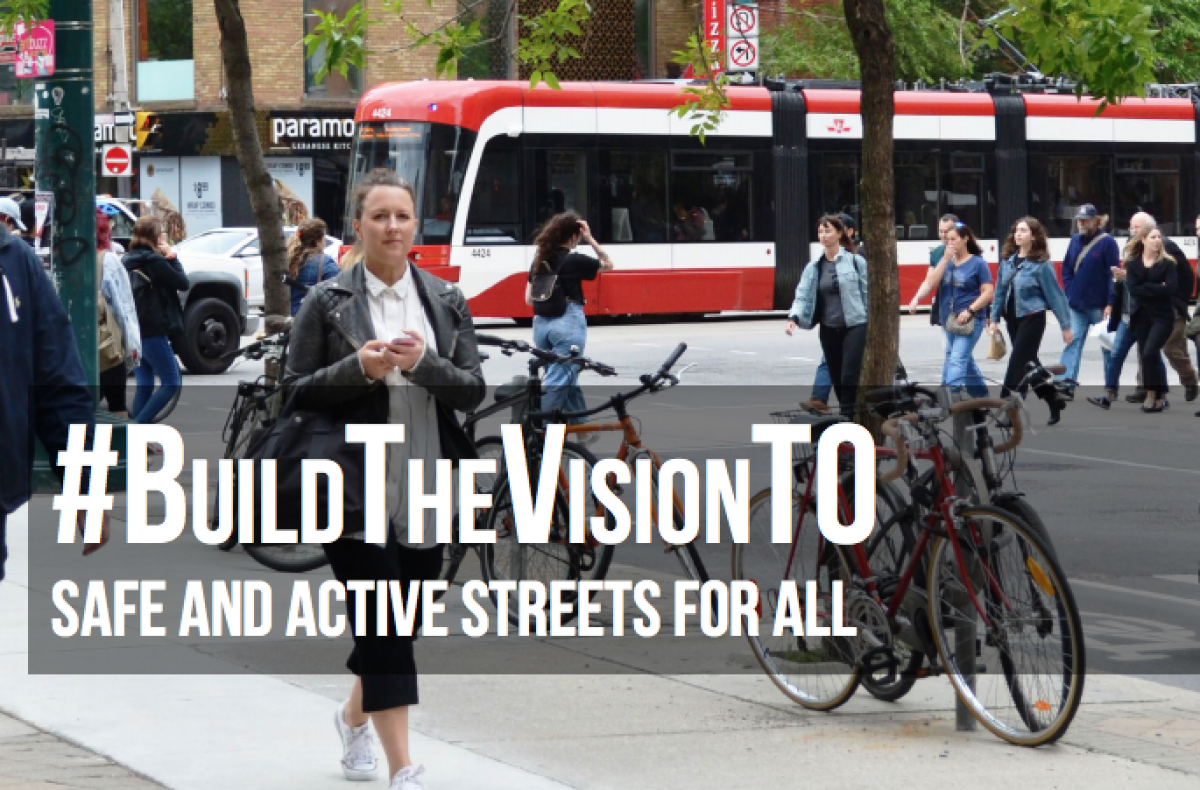Aiming to make road safety a key issue in this fall’s Toronto municipal election, Metcalf grantee Toronto Centre for Active Transportation (TCAT), in partnership with 8 80 Cities, Cycle Toronto, Friends and Families for Safe Streets, and Walk Toronto launched #BuildTheVisionTO: Safe and Active Streets for All on June 19, 2018. This new report identifies 15 recommendations for building and modifying streets so that people of all ages and abilities are able to move around “actively, sustainably and safely”.
Although Toronto City Council in 2016 approved the Vision Zero Road Safety Plan, a five-year plan to eliminate traffic-related fatalities and serious injuries on Toronto’s streets, the report notes that “when it comes to safety, our streets are failing”. In 2017, the first year of Vision Zero’s implementation, “40 vulnerable road users (people on foot and bicycle) died on our streets, only four fewer than the 44 that were killed in 2016.” Moreover, 2018 “has seen a surge in deaths” which are, according to the report, preventable.
The authors of the report write that proven solutions for improving road safety already exist. “We know how to build streets that are safe and accessible,” state the report’s authors. TCAT and other members of the coaltion have called on City Council to take immediate action on the fifteen priority recommendations outlined in the report.
The group will also distribute a survey to all of Toronto’s mayoral and city council candidates to gauge their support for these measures. Candidate responses will be published prior to the October 22 municipal election.
The 15 #BuildTheVisionTO Recommendations:
- Implement a city-wide default speed limit of 30 km/h on all residential streets and 40 km/h on all arterial and collector roads.
- Streamline the traffic calming process in Toronto.
- Implement traffic calming in all elementary school zones by 2022.
- Build sidewalks on every street being reconstructed.
- Ensure sidewalks have a minimum 2.1 metre pedestrian clearway on all arterial and collector roads.
- Build protected bike lanes on main streets, including major corridors listed in the Cycling Network Plan.
- Build safe, connected bike routes in every ward.
- Accelerate the Cycling Network Plan to be built in the next four years.
- Increase the use of automated traffic enforcement safety cameras.
- Prioritize the safety of vulnerable road users by outlawing motor vehicle right turns on red.
- Implement controlled crossings at all bus and streetcar stops.
- Create an implementation strategy for Toronto’s Complete Streets Guidelines.
- Support the Transform Yonge option for Yonge Street between Sheppard and Finch Avenues, which would reduce six vehicular lanes to four, install bike lanes, and increase sidewalk widths.
- Match New York City’s per-capita funding for Toronto’s Road Safety Plan.
- Support and fund a monthly Open Streets Toronto program from May to September in 2019 and beyond.


